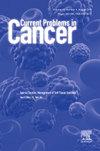Replication stress response and radioresistance in lung cancer: Mechanistic insights and advanced therapeutic approaches
IF 2.3
4区 医学
Q3 ONCOLOGY
引用次数: 0
Abstract
Lung cancer, the leading cause of cancer mortality globally, comprises mainly non-small cell lung cancer and small cell lung cancer. Its pathogenesis involves genetic mutations, environmental exposures, chronic inflammation, and tumor microenvironment interactions. Critical genes like TP53, RB1, KRAS, and EGFR often mutate, driving uncontrolled cell growth. Radiation therapy, a primary treatment, faces challenges with radioresistance due to DNA repair mechanisms and replication stress responses. Emerging therapeutic strategies target DNA repair pathways, cell cycle checkpoints, and immune responses to enhance radiosensitivity and counteract resistance. Promising approaches include PARP inhibitors, CDK inhibitors, EGFR blockers, and immunotherapies combined with radiation. Advances in understanding these mechanisms are crucial for developing targeted therapies to improve lung cancer patient outcomes. The present review focuses on elucidating the intricate mechanisms of lung cancer pathogenesis and radioresistance, while highlighting novel therapeutic strategies designed to overcome these challenges and improve treatment efficacy.
肺癌的复制应激反应和放射耐药:机制见解和先进的治疗方法
肺癌是全球癌症死亡的主要原因,主要包括非小细胞肺癌和小细胞肺癌。其发病机制涉及基因突变、环境暴露、慢性炎症和肿瘤微环境相互作用。关键基因如TP53、RB1、KRAS和EGFR经常发生突变,导致不受控制的细胞生长。放射治疗作为一种主要的治疗方法,由于DNA修复机制和复制应激反应,面临着放射耐药的挑战。新兴的治疗策略以DNA修复途径、细胞周期检查点和免疫反应为目标,以增强放射敏感性和抵抗耐药性。有希望的方法包括PARP抑制剂、CDK抑制剂、EGFR阻滞剂和放射联合免疫疗法。了解这些机制的进展对于开发靶向治疗以改善肺癌患者的预后至关重要。本文的重点是阐明肺癌的发病机制和放射耐药的复杂机制,同时强调新的治疗策略,旨在克服这些挑战,提高治疗效果。
本文章由计算机程序翻译,如有差异,请以英文原文为准。
求助全文
约1分钟内获得全文
求助全文
来源期刊

Current Problems in Cancer
医学-肿瘤学
CiteScore
5.10
自引率
0.00%
发文量
71
审稿时长
15 days
期刊介绍:
Current Problems in Cancer seeks to promote and disseminate innovative, transformative, and impactful data on patient-oriented cancer research and clinical care. Specifically, the journal''s scope is focused on reporting the results of well-designed cancer studies that influence/alter practice or identify new directions in clinical cancer research. These studies can include novel therapeutic approaches, new strategies for early diagnosis, cancer clinical trials, and supportive care, among others. Papers that focus solely on laboratory-based or basic science research are discouraged. The journal''s format also allows, on occasion, for a multi-faceted overview of a single topic via a curated selection of review articles, while also offering articles that present dynamic material that influences the oncology field.
 求助内容:
求助内容: 应助结果提醒方式:
应助结果提醒方式:


